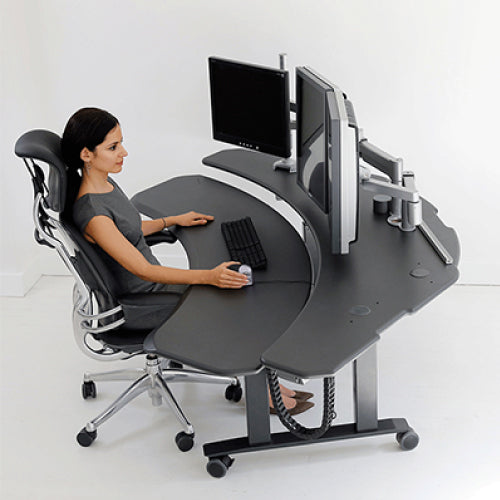Standing desks have emerged as a popular solution for combatting the sedentary lifestyle often associated with traditional office setups. While many tout the benefits of standing desks, skepticism remains about their effectiveness and potential drawbacks. Let's delve into the research and separate fact from fiction to answer the burning question: Are standing desks actually good for you?
Improved Posture and Musculoskeletal Health:
One of the most significant benefits of standing desks is their potential to promote better posture and reduce the risk of musculoskeletal issues. By encouraging users to stand upright, these desks can help alleviate the strain on the lower back, neck, and shoulders associated with prolonged sitting. Proper posture can also contribute to improved spinal alignment and reduced discomfort over time.
Enhanced Circulation and Energy Levels:
Standing desks have been shown to promote better blood circulation throughout the body compared to sitting for extended periods. Improved circulation can lead to increased energy levels, reduced feelings of fatigue, and enhanced cognitive function. By incorporating periods of standing into the workday, individuals may experience greater alertness and productivity.
Calorie Expenditure and Weight Management:
Standing desks offer a subtle yet effective way to increase calorie expenditure throughout the day. While the difference in calorie burn between sitting and standing may seem minimal, over time, these small changes can add up and contribute to weight management efforts. Additionally, standing desks may encourage individuals to move more frequently, further boosting calorie expenditure and overall physical activity levels.
Potential Drawbacks and Considerations:
Despite their numerous benefits, standing desks are not without potential drawbacks. Prolonged standing without breaks can lead to discomfort, fatigue, and varicose veins in some individuals. It's essential to strike a balance between sitting and standing throughout the day and incorporate regular movement breaks to prevent overexertion and promote circulation.
Finding the Right Balance:
Ultimately, the key to reaping the benefits of standing desks lies in finding the right balance that works for you. Standing for too long without breaks may lead to discomfort, while sitting for extended periods can have its own negative effects on health. Aim to alternate between sitting and standing throughout the day, incorporating movement breaks and ergonomic adjustments to optimize your comfort and well-being.
In conclusion, standing desks can indeed be beneficial for overall health and well-being when used appropriately. By promoting better posture, circulation, and energy levels, standing desks offer a versatile solution for combatting the negative effects of prolonged sitting. However, it's essential to approach standing desk usage mindfully, incorporating breaks and adjustments to ensure optimal comfort and productivity.

